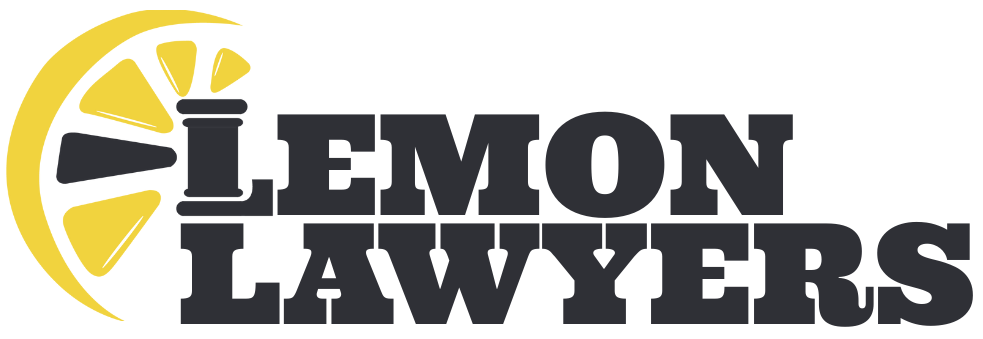When you purchase or lease a new motor vehicle in California that comes with auto manufacturer warranties and that vehicle turns out to be a lemon, you have full rights as a consumer and could seek legal relief under CA Lemon Law, known as the Song-Beverly Consumer Warranty Act.
If you’re thinking of filing a Lemon Law claim, here are the steps to do so.
Your Rights as a Car Buyer
California’s Department of Motor Vehicles has also published a detailed Car Buyer’s Bill of Rights describing your rights and legal options when you purchase or lease a new or used motor vehicle from an authorized dealership. To summarize, some of your rights as a consumer include:
- Itemized Price List. Dealers are required to fully disclose the full price you need to pay for the vehicle including a list of add-on items such as extended warranties, service contracts, options, insurance, devices, etc. No charges may be added to your purchase contract without your knowledge and consent.
- Credit Score Disclosures. The dealer will need to ask for your consent to conduct a credit check when you’re applying for financing and must disclose your credit score to you with a written statement on how it will be used.
- Financing Disclosures. The dealer can not add a markup amount to your financing costs beyond those prescribed by law which limits the commissions dealers can earn from lenders for every transaction processed.
- Used Cars Marked As Certified . Dealers can only advertise and sell used cars as “certified” if they comply with specific requirements. These include conducting a thorough vehicle inspection and providing you, the buyer, a copy of this inspection report.
- Option for Two-Day Cancellation. You have the right, subject to certain exceptions, to purchase from the dealer a two-day cancellation option when buying a used vehicle. With this option, you can take the car out for a test-drive or have it inspected by a mechanic. If you’re not satisfied with the vehicle or change your mind about the purchase, you have the right to cancel the contract and get a full refund from the dealer.
Government Agencies to Ask for Assistance
If you’re facing issues with your vehicle and need to file a report or complaint, here’s a list of federal and California state agencies that will be able to assist you:
OFFICE OF THE ATTORNEY GENERAL (OAG)
Assistance to file complaints. The California Attorney General’s Public Inquiry Unit can assist you to file a complaint about a car dealership or auto manufacturer. For more information, visit www.oag.ca.gov or call 1-800-952-5225.
NATIONAL HIGHWAY TRAFFIC & SAFETY ADMINISTRATION (NHTSA)
Vehicle recall & safety issues. To find more information about your particular vehicle’s safety issues and any vehicle recall information, please visit the National Highway Traffic Safety Administration (NHTSA) or call their Auto Safety Hotline 1-888-327-4236.
NEW MOTOR VEHICLE BOARD (NMVB)
Dispute resolution threough Mediation. You may contact the New Motor Vehicle Board (NMVB) for assistance if you have any dispute with a dealership or manufacturer about your purchase or lease agreement or product warranty. The NMVB runs the Consumer Mediation Services Program to help settle disputes informally. For more information, please visit www.nmvb.ca.gov or call (916) 445-1888 and ask to speak with a mediator.
CALIFORNIA DEPARTMENT OF INSURANCE
Canceled service contract complaints. You can visit the California Department of Insurance or call their Consumer hotline at 1-800-927-HELP (4357) for any questions about your vehicle’s service contract or if you want to file a complaint about a canceled service contract.
DEPARTMENT OF MOTOR VEHICLES (DMV)
Report or file a complaint about a dealership. To file a complaint or report any contract violation by a licensed motor vehicle dealership, you can seek assistance from Department of Motor Vehicles (DMV) through their Division of Investigations or file a complaint online by filling out the DMV Record of Complaint Form (.pdf file), which is also available by calling 1-800-777-0133.
DEPARTMENT OF CONSUMER AFFAIRS (DCA)
Arbitration program certification. Most vehicle manufacturers in California offer consumers a convenient option to settle disputes through in-house Lemon Law arbitration programs that are certified by the California Department of Consumer Affairs. For more information about the certification status of your car manufacturer’s arbitration program, you can visit the DCA website or call them 800-952-5210. If the manufacturer doesn’t run a state-certified arbitration program, you can file a complaint or ask for mediation with the New Motor Vehicle Board (NMVB).
CONSUMER MOTOR VEHICLE RECOVERY CORPORATION (CMVRC)
Consumer Recovery Fund issues. If the licensed dealership where you purchased your vehicle filed for bankruptcy or went out of business and you sustained financial losses or costs associated with the dealer’s inability to honor the terms of your sales contract, you may file a claim with the Consumer Motor Vehicle Recovery Corporation (CMVRC) which administers the Consumer Recovery Fund to help consumers in such situations. For more information, please visit their website at www.cmvrc.org or call them at 800-961-6175.
Find the Right Agency
For assistance in finding the appropriate government agency to file a report or complaint, you can contact the California Department of Consumer Affairs by visiting their website at www.dca.ca.gov or calling them at 1-800-952-5210.
For more information about the California Lemon Law, please visit this Frequently Asked Questions page.
Consult with a Lemon Law Attorney
If you suspect your car to be a lemon, it’s important to speak with an experienced California Lemon Law attorney who can help evaluate your case, thoroughly inform you about the law as it applies to your particular situation, and guide you through the documentation and claim process. Call us today at (323) 553-7525 for a free consultation or get in touch by filling out the form above.
Featured Image: Sacramento, View of California State Capitol from 10th Street licensed under Creative Commons CC BY-SA 3.0 License.

